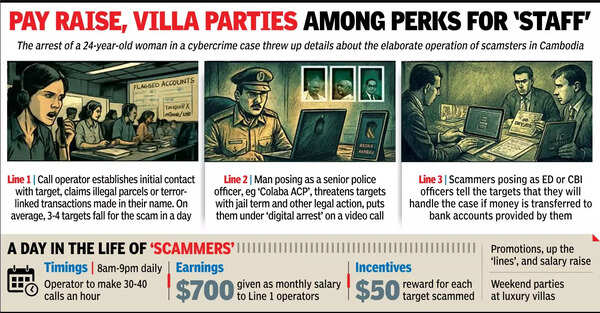ARTICLE AD BOX

GURGAON: Line 1 is the entry-level job in the cybercon food chain - the one who makes the call.In a separate room, designed to resemble a typical govt office in India, is Line 2. Here, a scammer dressed in police uniform sits for video calls, with framed portraits of Mahatma Gandhi, BR Ambedkar and Sardar Patel mounted on the wall behind.Line 3, a third room, hosts seasoned conmen. Posing as Enforcement Directorate or CBI officers, they know sections of laws such as UAPA, NDPS, FEMA, BNS and IPC with which they threaten their victims.
This was the architecture of a cybercrime call centre in Cambodia, where a woman from Surat landed up. Khushi Chaudhary (24) was arrested from IGI Airport in Delhi by Gurgaon police on June 29 after they got a tip-off that she was flying back to India.

Khushi was the 16th accused to be taken into custody after an 81-year-old woman in Gurgaon complained that she lost Rs 2.9 crore to an elaborate cyber scam that involved a 'digital arrest' for three days in Dec 2024.Investigators told TOI on Wednesday that Khushi's arrest and interrogation had revealed an elaborate syndicate that is at play."She was a cog in a massive machinery. These cybercrime operations have roots across borders and work with clockwork precision.
The financial trail is long and circuitous and often ends in crypto wallets," a senior police officer said.Khushi, police said, worked as a barista at a cafe in Surat. In Nov 2023, a friend's husband convinced her to move to Dubai for a better-paying job. There, she briefly worked at a cybercrime call centre in Ajman before the friend's husband allegedly put her in touch with a Pakistani recruiter who took her to Cambodia in Aug 2024.
The call centre she was employed at operated like a corporate office at a building called 'Mango Park' in Phnom Penh in the southeast Asian country."Every day, Line 1 operators were given a list of phone numbers to call. These callers posed as FedEx employees or law enforcement officials who told people that parcels addressed to them had illegal items or contraband. The other ruse was to say hawala transactions linked to their accounts were traced to terror outfits," the officer said.Line 1 operators like Khushi would scare the receivers with these claims. If they took the bait, the call would be transferred to Line 2."On Line 2 is the video call setup. A man, often posing as a Colaba police station ACP, would appear in a dimly lit room with photos of Gandhi, Ambedkar and Patel in the backdrop to make the fraud look legitimate. He would talk in an aggressive tone to get the victims to do as he said," the police officer said.The final step, Line 3, would be the appearance of an ED or CBI official -- who in this case went by the name of 'Rahul Gupta'. "This scamster would tell victims to transfer large sums of money into different bank accounts. By then, the victim had been isolated for some time, and was told not to disclose anything to anyone," the officer said.Lines 2 and 3 would be the 'digital arrest' stage, with constant mental pressure put on the victim, who would be instructed not to switch off the phone or communicate with anyone with threats of harm to family members.
Such 'digital arrests', as we have seen, have happened for weeks and months, during which victims have transferred crores of money from their own accounts into the accounts of scamsters, their ability to think logically compromised by fear.
Sometimes, they gave the money hoping to "settle", sometimes it would be to ascertain -- as instructed by scamsters -- to ascertain the money was clean. The 'digital arrest' would suddenly end once the money was gone.Rewards & partiesKhushi told investigators that she started out as a Line 1 operator but later assumed the role of a "merchant" -- one who would split the amount transferred to scammers by their targets into "mule accounts" in India. "Then the money was moved abroad and converted into cryptocurrency, all in 10-15 minutes," the police officer explained. Khushi's bosses were two Chinese citizens, known to her only as 'Lion' and 'Panda'.
She earned $700 (approximately Rs 60,000) as fixed monthly salary and made another $50 (nearly Rs 4,300) for every target who fell into the trap. "Her work hours were 9am to 8pm. As Line 1 caller, she made 30-40 calls an hour. And on average, 3-4 victims fell for the con," the police officer said.Well-performing scamsters also got promotions. "People were lured with promises of a better life. The more victims you trap, the more you could go up the ranks.
It meant getting closer to the bosses and getting a raise at every step. Another attraction was the weekend parties, which were organised for the call centre staff at luxury villas," the police officer said.In the case that led Gurgaon police to Khushi's arrest, 15 other suspects - most of them holders of mule bank accounts - were nabbed. They have been charged under sections 318(4) (cheating), 336(3) (forgery), 348 (making or possession of any instrument for counterfeiting a property mark) and 340 (forged document) of BNS.



.png)
.png)
.png)
















 2 days ago
7
2 days ago
7









 English (US) ·
English (US) ·